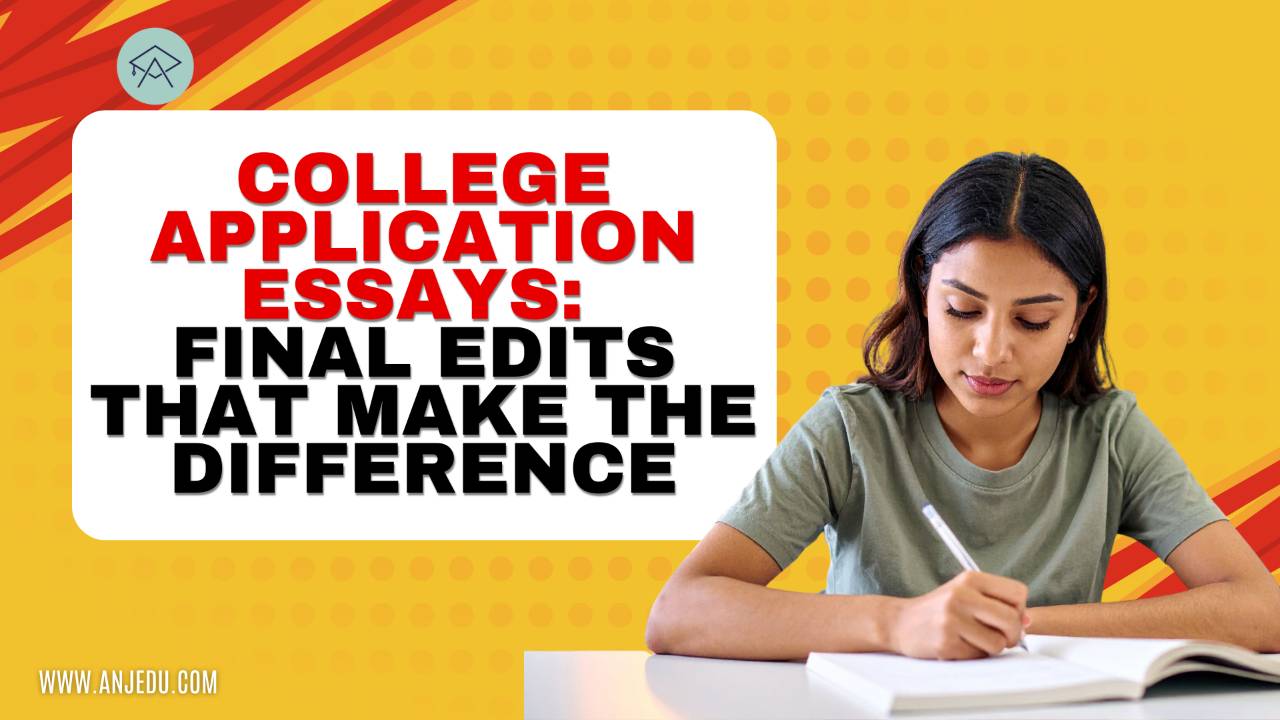College Application Essays: Final Edits that Make the Difference
Sep 30, 2025
3 Key Takeaways
- Finalizing essays involves refining voice, structure, and message—not just grammar.
- Supplementals should be tailored, specific, and consistent with the main application.
- A structured review process can reveal inconsistencies or opportunities to clarify key ideas.

As deadlines approach, it’s easy to focus solely on proofreading your college application essays for grammar or formatting. While those details matter, the final stage of essay preparation is more about clarity, voice, and consistency than surface-level polish.
These last steps are a chance to ensure that your story is truly complete.
Is the Essay Saying What You Mean to Say?
It’s common to become too familiar with your own writing. What seems clear to you may not be as transparent to someone unfamiliar with your background or goals.
Here are questions to ask during the final review:
- Does the essay clearly communicate your main message or insight?
- Is there a natural flow from beginning to end?
- Does the tone feel like your own voice?
- Have you included specific, meaningful details instead of vague generalizations?
Reading the essay aloud—or having someone else read it to you—can help you catch awkward phrasing, unclear ideas, or repetitive language. This small shift in perspective often brings out issues that silent reading misses.
Refining Voice and Authenticity
By this stage, the story and structure should be in place. Finalizing should not involve rewriting from scratch. Instead, the focus is on refining tone and trimming excess.
Some useful strategies:
- Simplify without dumbing down: Replace complex phrasing with clear, concise language.
- Watch for over-editing: Essays that go through too many revisions can lose the writer’s voice. Avoid turning your writing into something that sounds generic or over-polished.
- Stay personal, not performative: The strongest essays are honest, reflective, and rooted in lived experience.
Admissions officers read thousands of essays. A clear, grounded voice tends to stand out more than a clever or overly polished one.
What Strong Supplementals Have in Common
Supplemental essays often ask variations of the same questions:
- “Why this college?”
- “Why this major?”
- “What will you contribute?”
These shorter essays are an opportunity to connect your interests and values to a college’s offerings. But they need to be specific and personal.
For example:
- Instead of saying “I want to study psychology,” mention a specific lab, course, or project at the school that connects to your past experience or future goals.
- Instead of saying “I love community service,” mention the exact student organization you hope to join and why it matters to you.
Keep in mind:
- Each supplemental should add something new—not repeat what’s already in your main essay.
- Avoid copying and pasting the same text across multiple schools. Even small changes in wording can signal genuine interest.
- Stay within the word limits. Being concise is part of the skillset colleges look for.
Final Review Checklist
Before submitting, use a checklist to catch errors and ensure alignment:
- Grammar and spelling are accurate
- All prompts have been fully addressed
- Word counts are within the limit
- The tone and content are consistent across all essays
- You’ve avoided clichés and generalizations
- School names and details are correct (especially for supplementals)
- Formatting is intact after pasting into the application portal
This is also a good moment to revisit the rest of the application to ensure consistency. Essays should align with your activities, honors, and other materials. A strong application tells a coherent story across all components.
A Note on Getting Feedback
At this stage, feedback can still be helpful—if it’s focused and limited. Choose one or two readers you trust to give honest, constructive input. Be clear about what kind of feedback you’re looking for: clarity, tone, or flow—not content overhaul.
More isn’t always better. Too many opinions can make the essay feel disjointed or confused. The goal is to sharpen your own voice, not replace it with someone else’s.
Final Thoughts
Finalizing a college essay doesn’t mean making it perfect. It means making it clear, honest, and complete. Your story doesn’t have to be dramatic. It just has to be yours.
Taking the time to do a thoughtful final review is a worthwhile investment. Essays are one of the few parts of the application that allow you to speak directly to the admissions committee. A clear, focused voice—supported by precise language and relevant detail—can leave a lasting impression.

